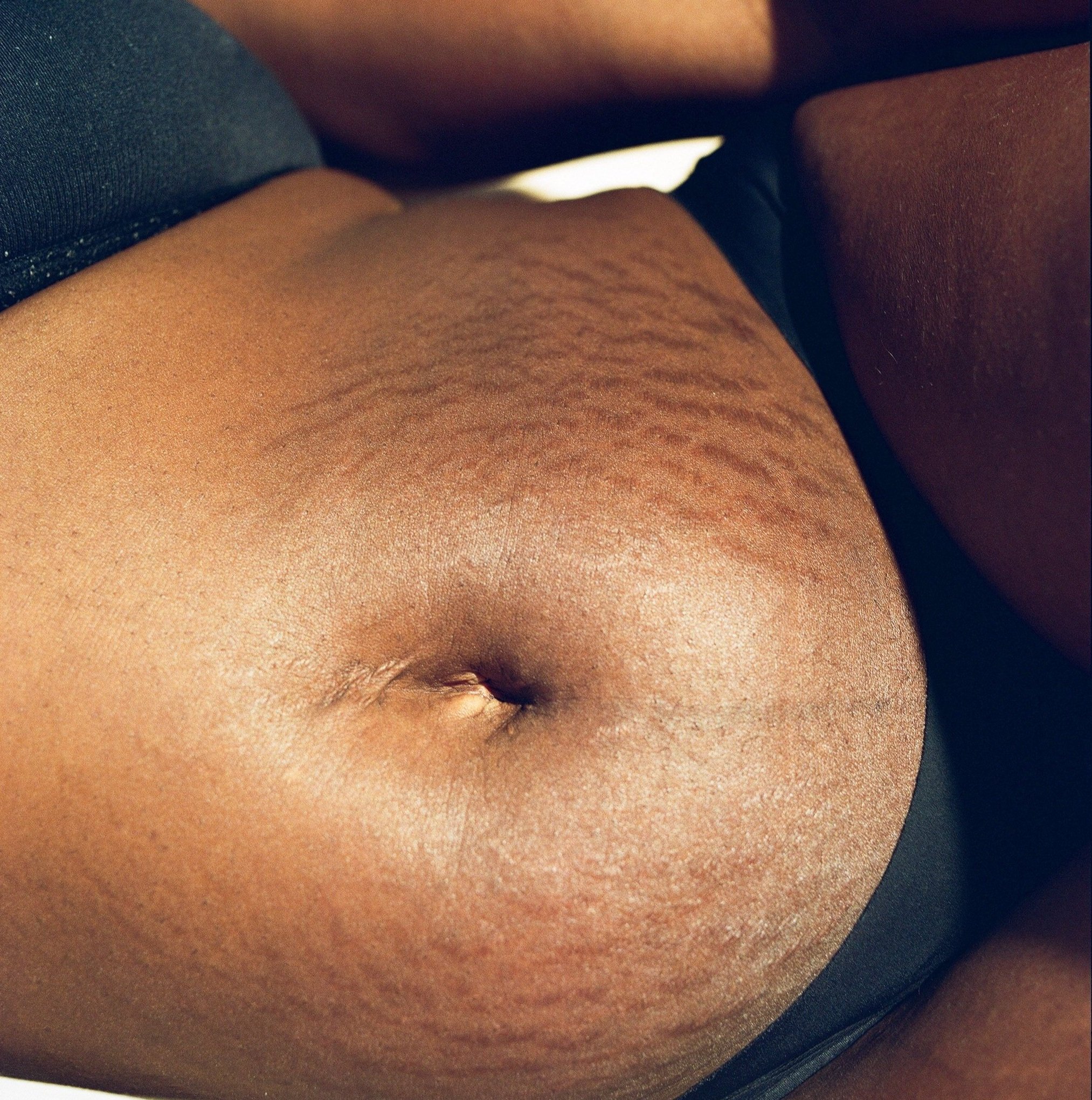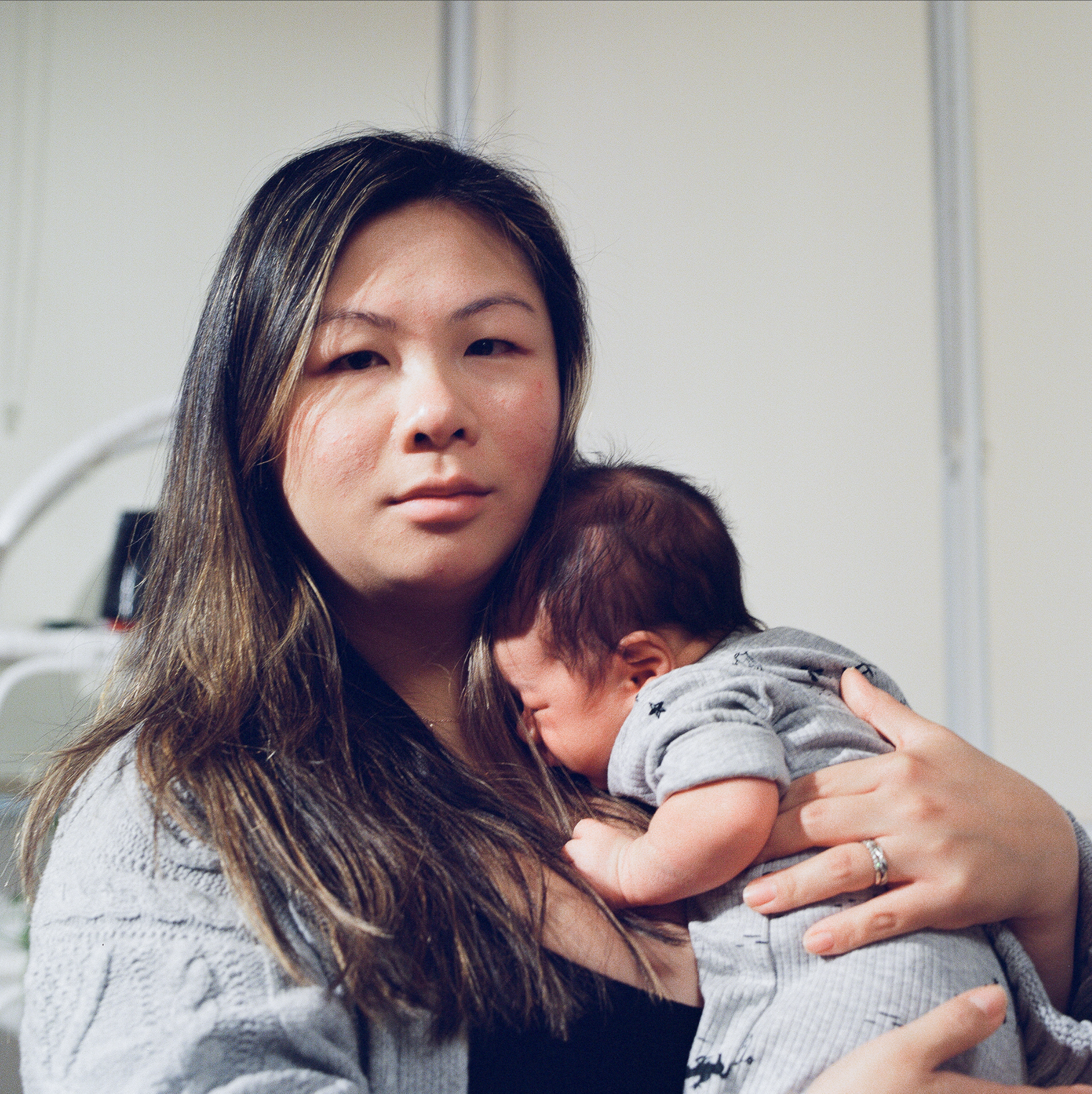Mom Puberty
In a world fixated on the idea of "bouncing back", the profound transformation that occurs for new mothers often goes unrecognized. Enter 'Mom Puberty' – a project dedicated to challenging bounce back culture and celebrating the birth of a mother, otherwise known as Matresence. Much like adolescence, this is a transitional period for moms marked by a storm of physical, psychological, and emotional changes. This is a metamorphosis. A rebirth. A process of becoming.
This is Mom Puberty. F*ck bouncing back.
Kylie Smith
@kyliesmithable
Mom puberty is like a second round of puberty, but instead of just physical changes, it's also about the emotional shifts that come with becoming a mother. It's realizing that there's more to life than just yourself and adapting to caring for others while navigating your own transformations.
-
Kylie's journey through motherhood had its fair share of peaks and valleys. The toughest part of Kylie's mom gig? Sleep deprivation and the endless demands of caring for a newborn. “During a time where you feel like you've been hit by a car, you have this tiny human who still thinks that they're inside of you and you have other people that need things from you too. I mean, that's what being a mom really is. It’s just a lot of people needing something.”
Yet, amidst the chaos, Kylie found gold in the joys of motherhood. She spoke of the deep bond forged during childbirth and cherished the tiny moments of growth. “Suddenly that onesie doesn't fit anymore and they're a little bit bigger, and now they giggle. It’s just these small little changes every day”.Her sage advice for birthing mothers? Expect the unexpected in childbirth and the whirlwind of postpartum recovery. She wished she knew more about the physical and emotional rollercoaster of the "fourth trimester," likening postpartum hormones to an instant puberty party. Kylie urged new moms to prioritize self-care, even if it's just stealing a few moments alone in the bathroom for a quick breather. And while asking for help might feel awkward as f*ck, she stressed its importance in keeping sanity intact.
Queeny Kuffour
@queenykuffour
Mom puberty is a transition that’s not about losing your old self, but rather about evolving and adding layers to the awesome person you already are.
-
Queeny rejects the idea that there's a one-size-fits-all approach to managing the transition into motherhood. She emphasizes the importance of allowing people to choose their own path in terms of physical and mental recovery. “For me, recovery meant for going out and experiencing the world with my baby as well. Recovery will look different for everyone and there should be grace in how people choose to go about it.”
Amidst the whirlwind of transitioning into motherhood, Queeny finds immense joy in seeing her son’s personality develop. She beams with pride as she observes her little one's kindness and sweetness, knowing that she's contributed to shaping those qualities.
Her advice for new moms is to tackle motherhood with a positive mindset. While it can be daunting hearing horror stories about labour and delivery, Queeny stresses the importance of believing in yourself. She emphasizes the power of mindset, urging moms to embrace their capability and remain mentally strong. While there are many things out of your control as a new mom, your mindset is one thing you can manage, giving you a bit of stability amidst the chaos of parenthood. So, moms, remember to take charge of your thoughts and feelings, because when you believe in yourself, you're already halfway there.
Janice Hebert
Mom puberty is like experiencing another growth spurt upon becoming a mom, where you learn to nurture another human while also developing physically, mentally, and emotionally. It’s about learning to juggle various roles as a mom, partner, friend, and woman while you transform in ways that you couldn’t have imagined.
-
Janice's journey into motherhood involved managing expectations, juggling various roles, and navigating relationships. She emphasizes the importance of maintaining her identity while raising a family. Loneliness and isolation occasionally crept in as she had to prioritize her family commitments over social commitments, leading to some friendships drifting apart. However, Janice finds fulfillment in the rewarding moments of motherhood, cherishing the bond she shares with her children
Reflecting on her experience, Janice wishes she had been more informed about the challenges of the fourth trimester . She encourages new moms to seek community, specifically with mommy groups and classes that focus on supporting mothers during the fourth trimester. These groups often cover topics like maternal mental health, postpartum recovery, and baby care, providing connections for moms navigating the early stages of motherhood. “Find your village. Find your people. Find people who understand and who you can turn to”. Janice herself is facilitating mommy and baby classes in Oakville and finds joy in giving back to other moms while building her own village of support.
Lesley Billingsley
@ellesavagefitness
Mom puberty is the most awkward, humbling journey of self-discovery.
-
Lesley had quite the adventure with childbirth. She recounted her plan for a peaceful home water birth, only to have it washed away when needed to be rushed to the hospital to give birth. She shared that nothing's off the table when it comes to birthing experiences - moms can experience anything from "popping hemorrhoids" to unexpected turns like needing a C-section.
Her advice to birthing moms? Forget about those detailed birth plans because, let's be real, babies have a mind of their own. Lesley learned the hard way that trying to stick to a plan is like trying to herd cats - futile and probably a bit messy. “You can have a plan, but ultimately the baby in your body is going to do what it wants to do.” Instead, focus on rolling with the punches and keeping your eyes on the prize: a safe and healthy delivery, no matter how it happens.
Lesley also advises new moms to embrace the idea that there's no one-size-fits-all approach to motherhood. She wishes she knew before having her baby that everything is normal. Despite the plethora of books and opinions out there, she emphasizes that whatever works for you and your baby is the right way. Tune out the noise of family, friends, and media, and focus on what's best for you and your little one. It's all about finding your own path and trusting your instincts.

Get Involved
Let’s replace conversations around “bouncing back” and shed light on the often overlooked and underestimated journey into motherhood. Share your story on social media using the hashtag #mompuberty
Mom Puberty Explained
Let's chat about "Mom Puberty," or as the fancy folks call it, "Matrescence." It's basically when you morph into a mom. It sounds straightforward but it’s actually really f*cking complicated.
Matresence, a term coined by medical anthropologist Dana Raphael, refers to the multi-faceted process of becoming a mother, which includes physical, hormonal, psychological, emotional, and social transformations. The reality is that some of these changes are going to be remarkable and awe-inspiring while others are really going to really suck. For example, while the body miraculously adapts to nurture life, it might also deal with things like prolapse (yeah, it's a thing), hair loss (goodbye, luscious locks), and the infamous hemorrhoids (ouch).
But wait, there's more! While some moms experience profound moments of connection and growth, matrescence might also throw emotional curveballs like postpartum depression and an identity crisis that could rival the angstiest teenager you know. Dr. Aurelie Athan, a clinical psychologist, likened matresence to adolescence – you know, that awkward phase where you're like, "Who am I?" and your body's like, "Surprise! I'm changing everything!" From the physical changes that may catch you off guard to the emotional roller coaster that leaves you wondering who we are, there's a whole lot more to motherhood than meets the eye.
Now, “Mom Puberty” isn't just for those who pop out babies – it's for anyone who dives headfirst into parenthood, whether through adoption, surrogacy, or any other baby-bringing means. It's a wild ride for all. So, whether you're dealing with hormonal hijinks or feeling like you're stuck in a Groundhog Day of dirty diapers, remember, you're not alone. Up to 20% of new moms are battling mental health issues, and about 38% are spending more time with their kiddos than with actual humans. Plus, for those giving birth, there's some cool science stuff – like how your brain does a complete overhaul during pregnancy and how cells from your baby stick around in your body (talk about a lifelong souvenir!).
So, if you're in the trenches of Mom Puberty and feeling like you're swimming in a sea of uncertainty, just know this: You're doing amazing. And contrary to popular belief, you're not expected to “bounce back” in six weeks. The physical recovery can take a solid six to nine months for that body to reset. And the emotional and psychological recovery? That’ll vary by individual - maybe it takes a few weeks, maybe it takes a few years. So f*ck all that talk about “bouncing back” because it's perfectly normal to change. Who doesn't during puberty?
Mom Puberty Support
Matresence by Lucy Jones
A book on Matresence that explores the psychological transformation a woman undergoes when she becomes a mother, offering insight and support for navigating the challenges of postpartum life.
Postpartum Support International
Postpartum Support International offers online support groups for mothers experiencing postpartum mood disorders. These groups provide a safe space for sharing experiences and accessing support.
Mommy Support Groups
Mommy Connections offers classes across Canada, providing a village-like community for thousands of moms. Alternatively, explore local community centres, libraries, and hospitals for parenting support groups or websites like Meetup.com to meet other local moms.
Canada Public Health Postpartum Health Guide
A comprehensive online guide covering postpartum health and caring for your newborn. It provides information on physical health, mental health, family health, nutrition, breastfeeding, as well as resources for pregnancy and infant loss.
Peanut App
Whether you're navigating fertility, pregnancy, motherhood or menopause, Peanut describes itself as a safe space to ask questions, find support and connect with other women.
Maternity and Newborn Care Guidelines by Canadian Government
Chapter 5 of the Maternity and Newborn Care Guidelines provided by the Canadian government offers detailed information on postpartum care, including physical and mental health considerations.
















